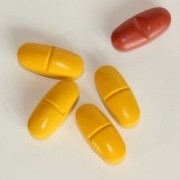Len Tooley is an HIV-negative gay man who takes pre-exposure prophylaxis (PrEP): he takes HIV medication to protect himself from infection. Len works in Toronto in the areas of health promotion, HIV education, testing and counselling for gay men. John McCullagh from the Canadian HIV portal PositiveLite.com spoke to him about his experiences with PrEP.

(Original: Len Tooley on PrEP Part One, 13.2.2013; Many thanks to John and Len for the permission to publish the interview here!)
In July 2012, the US Food and Drug Administration (FDA) approved the use of Truvada, a fixed combination of the HIV drugs emtricitabine and tenofovir, to reduce the risk of HIV infection in uninfected people at high risk of infection. This type of use of HIV medication to protect against infection is called pre-exposure prophylaxis, or PrEP for short.
Many consider PrEP to be an important breakthrough in the fight against HIV transmission. However, there are no signs that Canada will follow the US example in the near future - whether this would be desirable is a matter of debate among experts and the HIV community.
Is PrEP a breakthrough?
Nevertheless, Canadian doctors are also prescribing Truvada for PrEP to some of their patients - "off label", i.e. outside the actual authorisation. Len Tooley is one such patient. In a three-part interview, I spoke to him about the reasons for his decision, his experiences with PrEP and how he deals with criticism of his decision to take PrEP.
Len, thank you for agreeing to talk to PositiveLite.com about your decision to take PrEP. But before we get started, please tell us a little bit about yourself.

Gladly. I am a 31 year old gay man who lives, loves, cooks, cycles and works in Toronto. Professionally, I am HIV negative and work in the HIV field as a community health promotion coordinator at CATIEthe Canadian information portal on HIV and hepatitis C, where I supervise various projects on the sexual health of gay men. I also work part-time as a counsellor on HIV and other sexually transmitted infections (STIs) at the Hassle Free Clinic, a sexual health clinic in downtown Toronto, where I also do testing. I mention my professional background because it has given me a lot of knowledge about HIV and gay health that has influenced my decision to take PrEP. However, I would like to make it clear that I am conducting this interview as a private person and want to tell my individual story. I am not speaking on behalf of an organisation, but as someone affected by HIV.
Thanks for that clarification, Len. Then perhaps I should also mention that I am a member of the CATIE board. Now let's start with the obvious question: Why did you decide to take PrEP?
First and foremost, to avoid contracting HIV. My relationship with HIV is a little complicated. I know that with good treatment, medical care and social support, HIV infection is now a fairly manageable disease that doesn't necessarily have to turn your whole life upside down. Of course, this is not to say that it is easy or unproblematic to be HIV-positive today, but it is different from just ten years ago. It is different in terms of treatment options and long-term health benefits - especially if the infection is recognised and treated early. But even though I know that the world no longer has to collapse if I am infected with HIV, I also know that it is probably easier and overall better for my body to remain HIV-negative.
Sex during an epidemic entails increased risks
As I said, I am a relatively young, sexually active gay man who has sex with gay men in the middle of Toronto, the Canadian city with the highest HIV prevalence among gay men - according to the available data, about 23 per cent are infected. For me, that means that I almost certainly have had and will have sex with HIV-positive people. And through my work in the field of HIV testing, I know - as studies also show - that during an epidemic, almost all sexual activities, even low-risk ones such as giving head without a condom, carry an increased risk of infection.
"Sex in an epidemic" - an interesting description of the risk we gay men take when having sex. Could you say a bit more about that?
Sure. One of the main reasons I call it that is because of the way HIV spreads among men who have sex with men (MSM). Studies show that about 50 to 75 per cent of new HIV infections among MSM in Canada each year come from men who themselves have not been infected for long (we call this early or acute HIV infection). This is because someone who has just been infected is unlikely to be aware of it, but at the same time has an extremely high level of virus in their body fluids because the immune system is not yet able to contain viral replication.
Low risk does not mean risk-free
So if a sexual partner tells me that they are HIV-negative, it is still possible that they are in fact positive, and also that they have only recently been infected and therefore the risk of transmission is higher. And with such a chain of circumstances, even low-risk practices (remember: low-risk does not mean risk-free) are associated with a significantly increased risk of HIV transmission. So even if I have "low-risk" sex, I [as a gay man in an epidemic] have a higher risk of HIV infection than most other people.

For almost thirty years, most gay men have known that condoms offer the safest protection against HIV infection during anal sex - even in an epidemic. So why did you decide to take PrEP? Isn't it a bit like wearing a belt and braces?
Ha! To be honest, I'm not perfect, even if I wish I was. I admit that I haven't always used condoms consistently. I did manage to stay HIV negative for quite a while, but only through a combination of "responsible" condom use and luck when I wasn't quite so "responsible". And when I did expose myself to increased risk, I often worried a lot afterwards. It wasn't a permanent, overwhelming fear, but I couldn't really feel good after sex, not free of guilt and shame.
And PrEP would offer you additional protection against HIV in such a situation?
Exactly. Through my work in the HIV field, I get to hear about the latest developments and research findings in HIV treatment and prevention. And so I've also read things about PrEP and knew that its protective effect is quite high, even if it doesn't offer 100 per cent protection. But it hasn't been approved in Canada yet, so it didn't seem like a realistic prevention option for me. At the beginning of November 2012, I had another one of those days when I was worried about the risks I had taken since my last HIV test (against my "better judgement"). I thought to myself: Wouldn't it be great to have PrEP available? And then I suddenly realised that it was possible, that all I had to do was convince my doctor to prescribe me the medication. I was encouraged by the recommendations on PrEP for gay men that the American FDA had developed, and I also read the really helpful information from Project Inform, which helped me a lot in my decision-making process.
For me, PrEP is a way of taking responsibility
But beyond my own risk there are other reasons why I decided to take PrEP, namely the positive men in my life with whom I have had or will have relationships and/or sex. Through my work in HIV testing and my acquaintance with many positive people, I know that many of them want to avoid infecting their sexual partners at all costs. This sometimes leads to them only dating or having sex with other positive people. For me, PrEP is a way to not only take responsibility for my own sexual health (and that of my community), but also to help reduce HIV-positive people's fear of infecting their partners.
I also know that it can be very difficult for some positives to disclose their status to negatives, and I hope that I can make that easier for them through my PrEP. And last but not least, I want to help create a space for a more honest and open dialogue about our safer sex choices.









